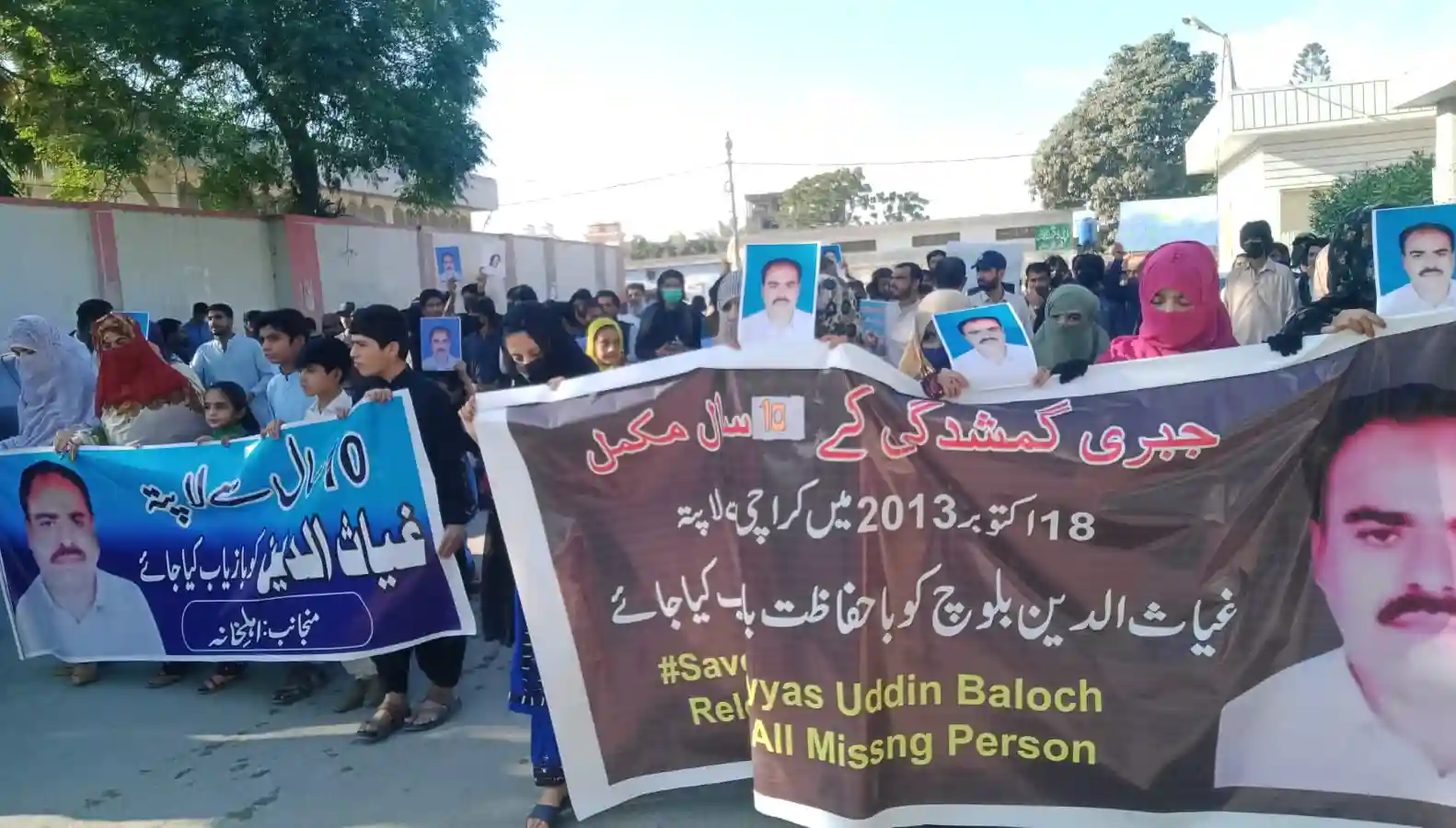

Baloch women and children at a protest for missing persons (Photo: Twitter)
While governance in Pakistan is entered a state of limbo under the interim government, its various conflicts continue at the same pace. The border with Afghanistan remains unsettled due to cross-border attacks while the Baloch armed groups continue to inflict damage on Pakistani security forces in the south-west.
India Narrative speaks with Abdul Basit, Senior Associate Fellow at the S. Rajaratnam School of International Studies, Nanyang Technological University, Singapore. Basit says that the Baloch insurgency has moved on to the next generation and the deaths of various leaders from time to time has not impacted the spirit of nationalism among the Baloch.


Excerpts from the interview.
IN: Please tell us something about yourself and your research work?
AB: I am a Senior Associate Fellow at the S. Rajaratnam School of International Studies, a think tank within the Nanyang Technological University, Singapore. I am head of the South Asia desk and our think tank looks at political violence, terrorism, insurgency etc. My core research area is Afghanistan and Pakistan but broadly follow South Asia. Concerning research work, the current focus is on how the Taliban’s takeover of Afghanistan has impacted Pakistan’s internal security and the threat landscape more specifically and the trajectory of TTP’s evolution as a threat group. Also, I look into Baloch insurgency, trying to understand the mergers and alliances of various Baloch separatist groups, how they have tried to achieve really resilience and longevity through alliances and mergers and the impact of these on the outcomes of the conflict.
IN: How do you see the whole Gulzar Imam Episode? Do you think Gulzar Imam meant when he said that Baloch should drop weapons and end insurgency or it was mere lip service because we don’t see any reaction from the Pakistan Army or the Baloch insurgents?
AB: It is hard to judge whether it was lip service or he meant it. The larger question is, has it been effective or not? Nobody can read into his mind or his thought process, whether he meant it or not, but he said it. But before this, we should look into the immediate and long-term impact of Gulzar’s arrest on the Baloch insurgency. His group Baloch Nationalist Army (BNA) has almost become dormant, earlier the group was very active in the Makuran around coastal areas of Balochistan. BNA has also been weakened which was a result of Gulzar’s interrogations by the security agencies, thereby neutralizing BNA’s network. BNA members have joined other groups like the Baloch Liberation Front and the Baloch Liberation Army. There were even statements from BNA calling out other Baloch organizations for backstabbing them, rather than helping BNA they tried to dissolve it.
So I think BNA in a way has become less relevant. But I never write off a group in an insurgency which has been trading for over two years based on genuine grievances, as long as those grievances are not addressed, the group can always come back. But for now, if you look at the noise that has come out of BNA it suggests that Gulzar was backstabbed, it was an insider’s job but I can’t verify that. And then you have the official version of the story that the security agencies have worked for several weeks coordinating with several countries to capture Gulzar Imam, the truth lies somewhere in between.
Looking at the larger impact, I think the Baloch insurgency is still very strong and it doesn’t matter if Gulzar has been arrested because the social base of the insurgency is very resilient and it doesn’t rely on one leader, one group or one individual, rather it relies on the genuineness of the grievances. The insurgency has transformed from a tribal struggle revolving around a few Sardars or feudal lords to an educated, urban middle class. The conflict has shifted from one generation to another and the new generation is wedded to a more radicalized form of Baloch nationalism. For them, the goal is separatism, not any compromise or autonomy and they believe in more violent tactics such as suicide terrorism.
So, an insurgency which has been raging on for 18-20 years and has survived the killing of Nawab Akbar Bugti, Balach Marri and Aslam Baloch will do fine even without Gulzar Imam and that helps you understand the impact of Gulzar’s words, whether they were genuine or not, even if they are genuine, people who are in insurgency will continue, there will be another Gulzar Imam tomorrow.
The important thing is that the insurgency on the battlefield is deadlocked and what is required is a political dialogue which is not taking place. Gulzar is right when he says to talk to the state as without a political dialogue, there will not be any logical outcome of a conflict. Without political dialogue, peace is not sustainable in the long run as people who will survive become even more violent. There is a mistake on both sides; on the part of the state as well as the insurgents that no trust and no serious dialogue is going on.
IN: With the changing geopolitics of the region, where do you see Baloch Insurgency going?
AB: As far as the Baloch Insurgency in Balochistan is concerned, several factors need to be taken into consideration – its geostrategic location, long coastline, minerals, Chinese investments and Saudi prospective investments. Balochistan shares borders with Afghanistan and Iran which has long porous borders with passage of illegal networks. There is China-US competition brewing and if you look at the South Asian region, India is closely allied with the US to contain China, wherein Chinese investments need to be undermined including in Balochistan. There is also India-Pakistan rivalry, which is one very convenient area for India to stoke problems in Balochistan. What happens in Baluchistan vis-e-vis India is a lot dependent on what Pakistan does or doesn’t do in Kashmir. So, the more Pakistan ups the ante in Kashmir, you will see India upping the ante in Balochistan, the more Pakistan diffuses it in Kashmir, you will see India diffusing it in Balochistan and it relates to the India-Pakistan peace process as well.
Social Media has bridged the distances between the Baloch diaspora in Europe, the Gulf, the US etc. and increased the flow of information. So, the discourse which is there between these Baloch diaspora groups and the Baloch-educated youth has given birth to a more radical form of nationalism. Balochistan is more than 40% of Pakistan’s territorial landmass so the insurgency will persist with ebbs and flows.
Baloch insurgents have found sanctuaries or havens in Iran and insurgency which has external sanctuaries last longer. With China investing in Iran and the Saudi-Iran rapprochement, I think even Iran will be opening up and may be less welcoming to these Baloch separatists. But I think even if those sanctuaries are not there, the problem in Balochistan is so huge that the insurgency is not going to evaporate overnight and I don’t see them improving remarkably or becoming more violent, it will be what it is as of now because of longevity and resilience in Baloch struggle.
IN: Why is the Pakistan Army alien towards Baloch issues considering Insurgency has been going on for 7 decades now?
AB: It’s not seven decades old; the insurgency has come in five waves. The current wave is the longest, the previous waves were much smaller. But if you look at each wave, the next wave is bigger than the previous one. Earlier waves were two to five years long. This one is about 17 years continuing if you take 2006 Akbar Bugti’s killing as the baseline. It’s not that Pakistan Army is alien to it but they have militarized the conflict to such an extent that they do not know where to start. Any Baloch politician, student, civil society activist or journalist will state solution to the Baloch issue will start from the issue of enforced disappearances; extra judicial rounding up of people and some of them end up as dead bodies on the roadside or in mass graves.
The other dimension is CPEC, not only for security but also for the investment that China has brought in; the military establishment is the main guarantor for Chinese stakes in Baluchistan. Counter-insurgency is always the military component subordinated to a political vision or strategy, counterinsurgency is the use of force to create a vacuum which can be exploited politically but in Pakistan it is the other way around that the military component dominates the political strategy, sometimes even there is no political strategy and only endless militarized counterinsurgency going on. And this has alienated an entire population. I think where they need to start is to allow the politician to take a lead and there is a dire need to find a solution to the missing persons issue. Next is allowing genuine political leadership to participate in a free fair, democratic process of voting and the genuine political leadership should come to the power corridors to talk about the genuine issues of the Baloch only then some trust-building can be done.
Union Minister for Communications and Development of the Northeastern Region Jyotiraditya Scindia on Tuesday highlighted…
India handed over 1000 metric tonnes of rice and essential medicines to Cameroon. Cameroon's Minister…
US President Donald Trump has once again reiterated that the West Asia ceasefire is in…
Russian Security Council's Deputy Secretary, Aleksandr Venediktov, called on National Security Advisor Ajit Doval on…
National Security Advisor Ajit Doval held a meeting with Chinese Foreign Minister Wang Yi in…
Amid the conflict between Iran and Israel, a total of 292 Indian nationals were evacuated…